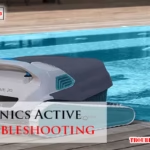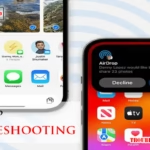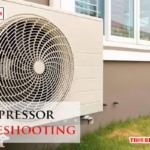Imagine this: you’re all set to tackle those stubborn grime spots on your patio with your Ryobi 2000 Psi Electric Pressure Washer. You’ve got your gloves on, the hose connected, and you’re ready to see the magic happen.
But instead of a powerful jet stream, you get. . . Nothing. Frustrating, right? You’re not alone. Many users face similar hiccups with their pressure washers. But don’t worry—this article is here to help you troubleshoot those pesky issues. We’ll guide you through simple, straightforward solutions to get your washer back in action, saving you time and avoiding unnecessary stress.
Whether it’s a sudden drop in pressure or a mysterious leak, we’ve got the answers you need. Ready to solve your pressure washer problems and get back to cleaning? Let’s dive in.
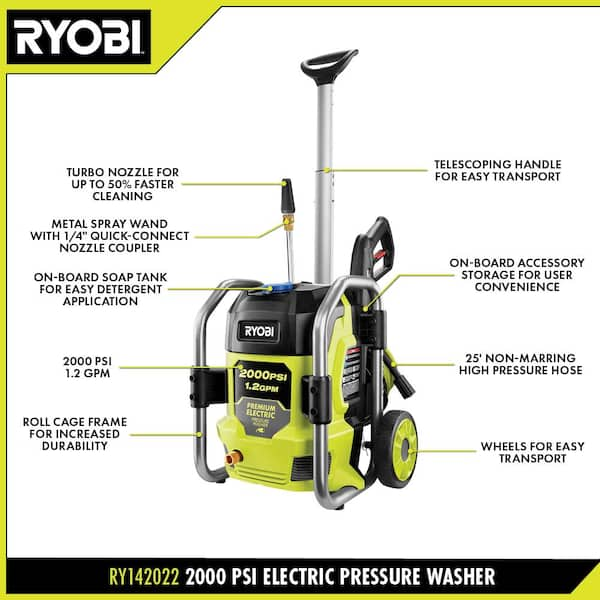
Credit: www.homedepot.com
Common Issues
Pressure issues often arise with the Ryobi 2000 Psi Electric Pressure Washer. Low water flow may indicate clogged nozzles. Motor failure could result from an electrical problem or overheating. Regular maintenance helps prevent these common challenges.
When using your Ryobi 2000 Psi Electric Pressure Washer, you may encounter some common issues that can hinder its performance. Understanding these problems and knowing how to troubleshoot them can save you time and keep your cleaning tasks on track. Let’s explore some of the frequent issues users face and how you can tackle them efficiently.1. The Pressure Washer Won’t Start
First, ensure that your pressure washer is plugged in properly. Check the power outlet and verify that it’s functioning by testing with another device. If the power connection is fine, inspect the reset button on the plug and press it if needed.2. Low Pressure Output
Low pressure can be frustrating, especially when you’re in the middle of cleaning. Examine the nozzle to see if it’s clogged with debris; a quick rinse can often solve this. Also, confirm that the water supply is adequate and the hose is not kinked or obstructed.3. Water Leaks From The Unit
Water leaks can be a sign of worn-out seals or loose connections. Carefully inspect all hose connections and tighten them if necessary. If the issue persists, consider replacing seals or O-rings, which are often the culprits behind leaks.4. Motor Stops Unexpectedly
A motor that stops suddenly can be alarming. Make sure the extension cord is suitable for the pressure washer’s power requirements to prevent overheating. Check if the unit has overheated and needs a break; give it a few minutes to cool down before restarting.5. Strange Noises During Operation
Strange noises can indicate something is amiss inside the unit. Ensure the pump is adequately lubricated and there are no loose parts. Regular maintenance can prevent these noises from escalating into major problems.6. Inconsistent Spray Pattern
An erratic spray pattern often points to a blocked nozzle. Remove the nozzle and clean it with a fine needle or the nozzle cleaning tool provided. This simple step can restore a consistent and powerful spray. Remember the time you were on a tight schedule, and your pressure washer didn’t cooperate? Addressing these issues swiftly can turn a potential disaster into just another day of cleaning. What other challenges have you faced with your pressure washer, and how did you overcome them? Share your experiences and tips with fellow readers in the comments below!Washer Won’t Start
Experiencing issues with your Ryobi 2000 Psi Electric Pressure Washer? A common problem is the washer not starting. Check the power source and connections to ensure everything is plugged in correctly. Inspect the fuse and reset the ground fault circuit interrupter to restore functionality.
If your Ryobi 2000 Psi Electric Pressure Washer isn’t starting, don’t panic. It happens to the best of us. Whether you’re gearing up for a spring cleaning session or tackling stubborn grime on your driveway, a non-starting washer can throw off your plans. Let’s explore some practical steps to get your machine back in action.Power Source Check
First things first, confirm your power source is reliable. Is the outlet functioning? Try plugging in another appliance to test it. Ensure your extension cord is suitable for heavy-duty use. Not all cords are created equal; a light-duty one might not deliver the juice your pressure washer demands.Reset Button Use
Most Ryobi washers come with a reset button. Have you tried pressing it? Sometimes, a simple reset is all it takes to clear minor hiccups. Think of it as giving your washer a fresh start. If it still doesn’t work, it’s time to dig deeper.Fuse And Circuit Breaker Inspection
Could the issue be a blown fuse or tripped circuit breaker? These are often overlooked but can cause frustration. Check your home’s fuse box or circuit breaker panel. Are any switches flipped or fuses blown? Address these issues promptly, and you might find your washer roaring back to life. In troubleshooting, patience is key. You might wonder why your washer won’t cooperate when you need it most. Could it be a sign to double-check your setup? Addressing each step could save you from unnecessary repairs or replacements. So, next time your washer stays silent, consider these steps. You may just find the solution is simpler than you think!Low Pressure Output
Your Ryobi 2000 Psi Electric Pressure Washer is designed to tackle tough cleaning jobs with ease, but what happens when it starts showing low pressure output? This can be frustrating, especially when you’re in the middle of a cleaning spree. Understanding the causes of low pressure can save you time and effort. Let’s dive into some common issues and solutions.
Nozzle Blockage
One of the most common reasons for low pressure is a blocked nozzle. Dirt and debris can accumulate, restricting water flow. You might have noticed the spray pattern isn’t as strong or consistent as usual. To fix this, check the nozzle for any visible obstructions.
Use a needle or a piece of wire to clear the blockage. This simple action can restore the pressure and improve the performance significantly. Have you cleaned your nozzle lately?
Water Supply Adequacy
Another culprit could be inadequate water supply. Your pressure washer needs a steady flow of water to maintain high pressure. Make sure your garden hose is fully open and free from kinks.
Check if the water source is providing enough pressure. Sometimes, connecting to a different faucet with better water pressure can make a world of difference. Is your water supply up to the task?
Pressure Hose Inspection
A damaged or leaking pressure hose can also lead to low pressure output. Inspect the hose for cracks or leaks. Even a small tear can reduce the pressure significantly.
Replace the hose if necessary. A new hose can revitalize your washer’s performance. Have you inspected your hose for wear and tear?
These troubleshooting steps are easy to execute and can get your Ryobi pressure washer back to optimal performance. Try them out and see the difference they make. What other tips have you found effective in maintaining your pressure washer?
Water Leakage
Experiencing water leakage in your Ryobi 2000 PSI Electric Pressure Washer can disrupt cleaning tasks. Inspect hoses and connections for cracks or loose fittings. Address these issues promptly to ensure efficient performance.
Water leakage in your Ryobi 2000 PSI Electric Pressure Washer can be both frustrating and costly. It often leads to decreased performance and can even damage the unit over time. Understanding how to troubleshoot this issue effectively can save you time and money, ensuring your pressure washer operates smoothly.Hose Connection Tightening
A common cause of water leakage is loose hose connections. Check each connection point carefully. Ensure all connections are secure by twisting them tight, but not too tight to avoid damaging the threads. A loose connection might seem insignificant, but it can lead to significant water loss. Make it a habit to inspect hose connections before each use. This simple check can prevent unexpected interruptions during your cleaning tasks.Seal And O-ring Examination
Worn or damaged seals and O-rings are frequent culprits of water leaks. These small components play a big role in maintaining a tight seal. Inspect them closely for any cracks or signs of wear. Replacing faulty seals and O-rings is straightforward and inexpensive. Keep spare parts on hand to avoid delays in your cleaning routine. Have you ever noticed water dripping from your pressure washer’s connections? That’s a sign to check these critical components.Pump Inspection
The pump is the heart of your pressure washer, and a malfunction can lead to leaks. Inspect the pump housing for cracks or damage. A leaking pump often indicates internal issues that might require professional attention. Routine checks can help catch potential problems early. Have you ever considered how much a small crack can affect the pump’s efficiency? Keeping the pump in good condition ensures your pressure washer works at its best, every time you use it. Addressing water leakage proactively keeps your Ryobi 2000 PSI Electric Pressure Washer running efficiently. Next time you prepare for a cleaning session, take a few minutes to perform these checks. It’s a small investment of time that pays off with a reliable and powerful cleaning tool.Motor Overheating
Motor overheating is a common issue with pressure washers. It can lead to significant problems if not addressed. Understanding the causes can help you prevent it. The Ryobi 2000 PSI Electric Pressure Washer might overheat due to several factors. Let’s explore some key considerations for troubleshooting this issue.
Ventilation Check
Ensure adequate ventilation for the motor. Blocked vents can cause overheating. Clean the vents regularly to remove dirt or debris. Position the pressure washer in a well-ventilated area. This helps maintain optimal airflow and motor temperature.
Duty Cycle Awareness
Be aware of the duty cycle. The Ryobi pressure washer isn’t designed for continuous use. Operate it in intervals to prevent overheating. Rest the motor after extended use. This practice prolongs the lifespan of your pressure washer.
Ambient Temperature Considerations
Consider the surrounding temperature. High ambient temperatures can contribute to motor overheating. Use the washer during cooler parts of the day. Avoid direct sunlight when operating your pressure washer. This reduces the risk of overheating and ensures efficient performance.

Credit: www.youtube.com
Unusual Noises
Strange sounds from your Ryobi 2000 Psi electric pressure washer can signal mechanical issues. Regular maintenance may prevent these noises. Check for loose parts or debris in the pump.
Unusual noises coming from your Ryobi 2000 Psi Electric Pressure Washer can be quite alarming. They might signal underlying issues that need your attention. Imagine being halfway through cleaning your deck when suddenly, your pressure washer starts making strange sounds. This can be frustrating and even stressful. But don’t worry—understanding the cause of these noises can help you address them effectively. Let’s explore some common sources of unusual noises and how to fix them.Pump Maintenance
Proper pump maintenance is crucial for a smoothly running pressure washer. A whining or grinding sound might indicate that the pump needs attention. Check the pump for any signs of wear or damage. Regularly inspect and clean the pump to ensure optimal performance. Use a soft brush to remove any dirt or debris that may have accumulated. Sometimes, simply lubricating the pump can make a big difference. Use a manufacturer-recommended lubricant to keep the pump parts moving efficiently. Regular maintenance can prevent these noises and extend the life of your pressure washer.Loose Parts Identification
Loose parts can cause clanking or rattling sounds. These noises are not only annoying but could lead to further damage if not addressed. Start by checking all the nuts and bolts on your pressure washer. Tighten any that seem loose. A quick inspection can save you from bigger repair bills down the line. Pay special attention to the hose connections and spray wand. Ensuring everything is secure can eliminate the irritating noises and improve your washer’s performance.Debris Removal
Debris inside your pressure washer can cause unusual noises. If you hear a buzzing or vibrating sound, it might be debris caught in the machine. Turn off the washer and inspect the inlet filter. Remove any visible dirt or debris. Consider the environment where you use your pressure washer. Is there a lot of dust or small particles? Cleaning the filter regularly can prevent debris buildup and the noises that come with it. This simple step can lead to quieter operation and more efficient cleaning. Have you ever ignored those noises only to find your washer breaking down mid-job? It’s a reminder that addressing issues early can save time and frustration. Listen to your pressure washer—it’s trying to tell you something. Are you ready to act on what you hear?Soap Dispenser Issues
Soap dispenser issues with your Ryobi 2000 Psi Electric Pressure Washer can be frustrating, especially when you’re all set to tackle the grime and suddenly, the soap just won’t flow. Whether you’re a weekend warrior or a cleaning enthusiast, understanding how to fix these issues is crucial. Let’s dive into some practical solutions to get your washer’s soap dispenser back in action.
Detergent Type Suitability
Are you using the right detergent? Not all soaps are created equal, and using the wrong type can affect the dispenser’s performance. Ensure your detergent is specifically formulated for pressure washers. If you’ve ever noticed your washer struggling to dispense soap, it might be time to switch brands. A simple change in detergent type can often resolve the issue and keep your cleaning session smooth.
Dispenser Tube Inspection
Sometimes, the problem lies in the dispenser tube itself. Check for any visible kinks or blockages. You might recall a time when your washer suddenly stopped dispensing soap mid-clean; a quick inspection of the tube revealed a tiny pebble lodged inside. Regularly inspecting and clearing the tube ensures a steady flow of detergent, making your cleaning tasks hassle-free.
Clogged Nozzle Cleaning
Is your nozzle clogged? A blocked nozzle can hinder soap flow, leaving you in a suds-free situation. Consider using a thin wire or needle to clear any debris from the nozzle. Have you ever wondered why your washer’s performance drops unexpectedly? It might be as simple as a clogged nozzle. Regular cleaning can prevent such setbacks, ensuring your pressure washer operates at its best.
Addressing these soap dispenser issues not only enhances your cleaning efficiency but also extends the lifespan of your Ryobi pressure washer. What techniques have you tried to solve soap dispenser problems? Share your experiences and insights to help others navigate their cleaning challenges.
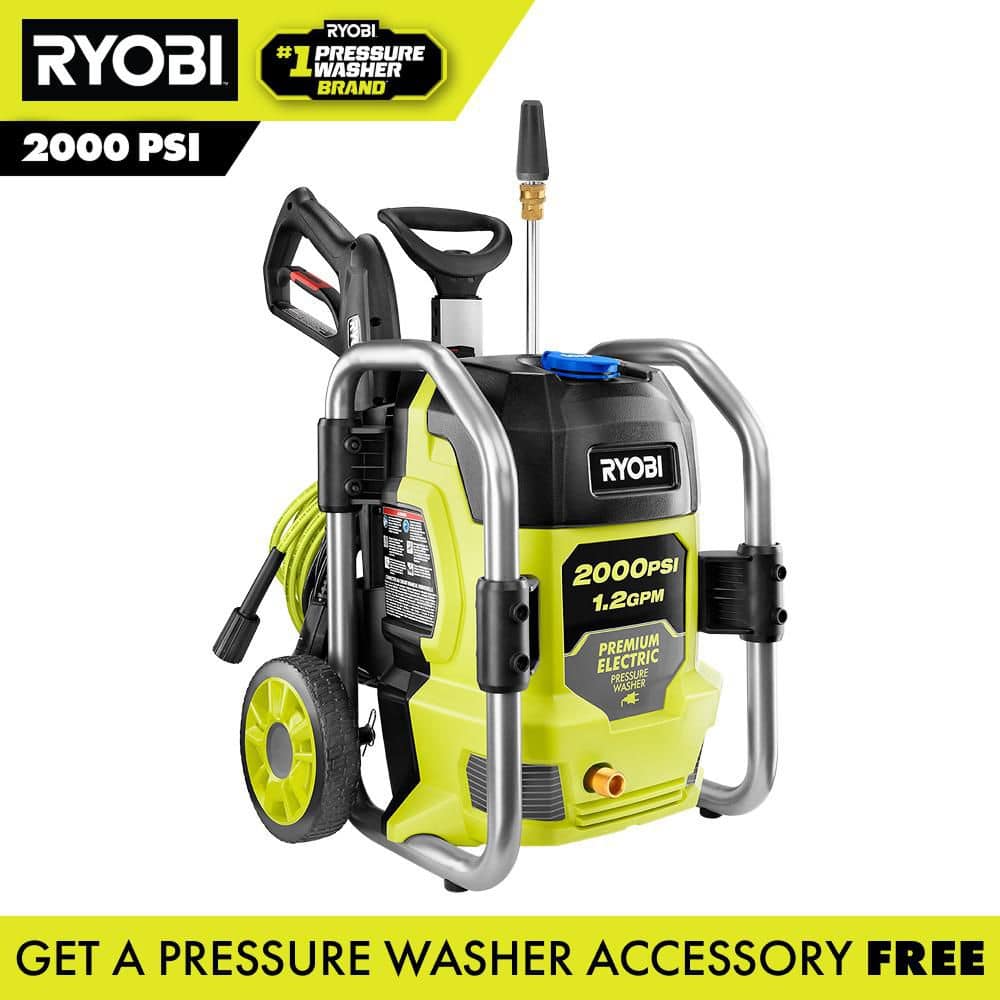
Credit: www.homedepot.com
Maintenance Tips
Maintaining your Ryobi 2000 Psi Electric Pressure Washer is crucial. It ensures optimal performance and extends its lifespan. Follow these maintenance tips to keep your pressure washer running smoothly.
Regular Cleaning
Clean the pressure washer after each use. Wipe down the exterior with a damp cloth. Remove any dirt or debris. Check the nozzle and spray gun. Ensure they are free from blockages. Flush the system with clean water. This prevents mineral buildup.
Proper Storage
Store the pressure washer in a dry place. Avoid areas with extreme temperatures. Detach the hose and accessories. Coil the hose neatly. Protect the machine from dust and moisture. This prevents rust and damage.
Scheduled Servicing
Plan regular servicing sessions. Inspect the machine for wear and tear. Check the electrical components. Replace any damaged parts. Lubricate moving parts. This ensures smooth operation. Regular servicing keeps your pressure washer efficient.
Frequently Asked Questions
Why Won’t My Ryobi Pressure Washer Start?
Ensure the power cord is plugged in. Check the circuit breaker. Inspect the GFCI reset button.
How Do I Fix Low Pressure In My Washer?
Clean the nozzle. Clear any blockages. Check for kinks in the hose. Ensure water supply is adequate.
What Should I Do If My Washer Leaks?
Inspect connections for tightness. Replace worn-out seals. Ensure the hose is not damaged or cracked.
Why Does My Pressure Washer Shut Off Suddenly?
Check for overheating. Ensure the water supply is consistent. Verify that the power source is stable.
How Can I Prevent My Washer From Pulsating?
Check for clogs in the nozzle. Ensure the pump is primed. Inspect hoses for air leaks.
Conclusion
Troubleshooting your Ryobi 2000 Psi Electric Pressure Washer can be simple. Start by checking power connections. Ensure the water supply is on and strong. Inspect hoses for kinks or leaks. Clean the nozzle to clear any blockages. Regular maintenance helps prevent issues.
Always refer to the manual for guidance. Keep tools handy for quick fixes. These steps save time and frustration. Enjoy the efficiency of your pressure washer. Maintain it well for a longer lifespan. Happy cleaning with your Ryobi washer!



